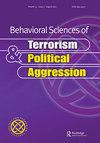反穆斯林歧视和对暴力极端主义的支持:来自五个大n调查的证据
IF 1.3
Q2 POLITICAL SCIENCE
Behavioral Sciences of Terrorism and Political Aggression
Pub Date : 2021-03-04
DOI:10.1080/19434472.2021.1892799
引用次数: 0
摘要
学术和公共政策都经常将反穆斯林歧视与支持暴力伊斯兰极端主义联系起来。然而,缺乏强有力的经验证据。考虑到反穆斯林歧视在西方不断抬头,这样的联系尤其令人担忧。生活在西方的穆斯林,如果经历或感受到反穆斯林歧视,是否更有可能支持暴力的伊斯兰极端主义?本文通过对生活在美国和英国的穆斯林进行的五项具有全国代表性的大型调查来检验这种联系。此外,这篇文章还测试了穆斯林对暴力极端主义的支持是否会在反穆斯林歧视的经历或感知与(1)年轻和(2)与大多数人口的低认同相结合时增加。结果是不确定的,表明反穆斯林歧视和支持暴力伊斯兰极端主义之间的联系可能更为复杂。本文章由计算机程序翻译,如有差异,请以英文原文为准。
Anti-Muslim discrimination and support for violent extremism: evidence from five large-N surveys
ABSTRACT
Both academic and public policy accounts often draw a link between perceived anti-Muslim discrimination and support for violent Islamist extremism. However, robust empirical evidence is lacking. Such a link would be particularly worrying, given that anti-Muslim discrimination has been on the rise in the West. Are Muslims living in the West who experience or perceive anti-Muslim discrimination more likely to support violent Islamist extremism? This article tests this association with the help of five large-N nationally representative surveys of Muslims living in the US and the UK. In addition, the article also tests whether Muslims’ support for violent extremism increases when the experience or perception of anti-Muslim discrimination combines with (1) young age and (2) low identification with the majority population. The results are inconclusive, indicating that the link between anti-Muslim discrimination and support for violent Islamist extremism is likely more complicated.
求助全文
通过发布文献求助,成功后即可免费获取论文全文。
去求助
来源期刊

Behavioral Sciences of Terrorism and Political Aggression
POLITICAL SCIENCE-
CiteScore
4.80
自引率
10.00%
发文量
27
 求助内容:
求助内容: 应助结果提醒方式:
应助结果提醒方式:


